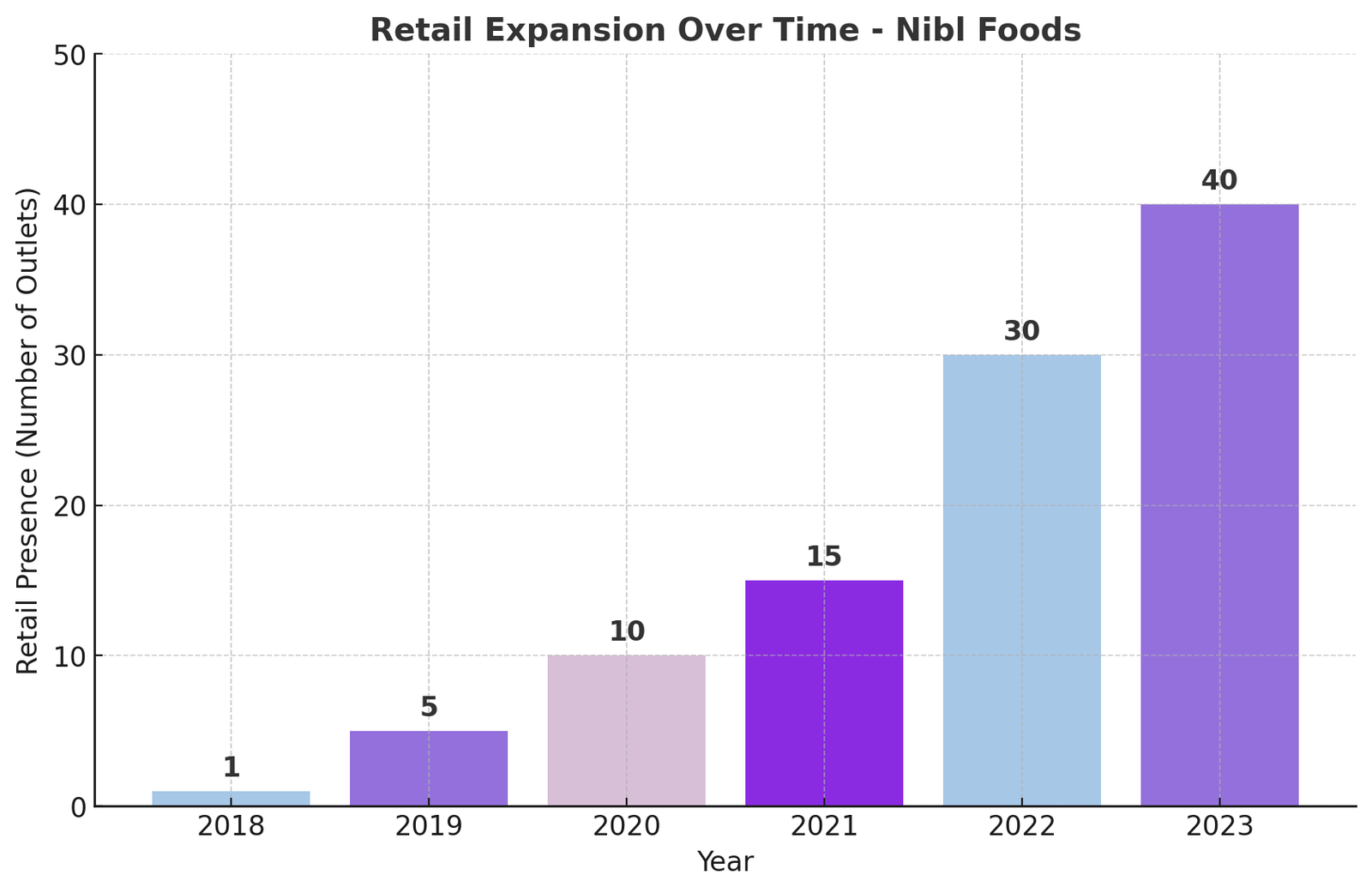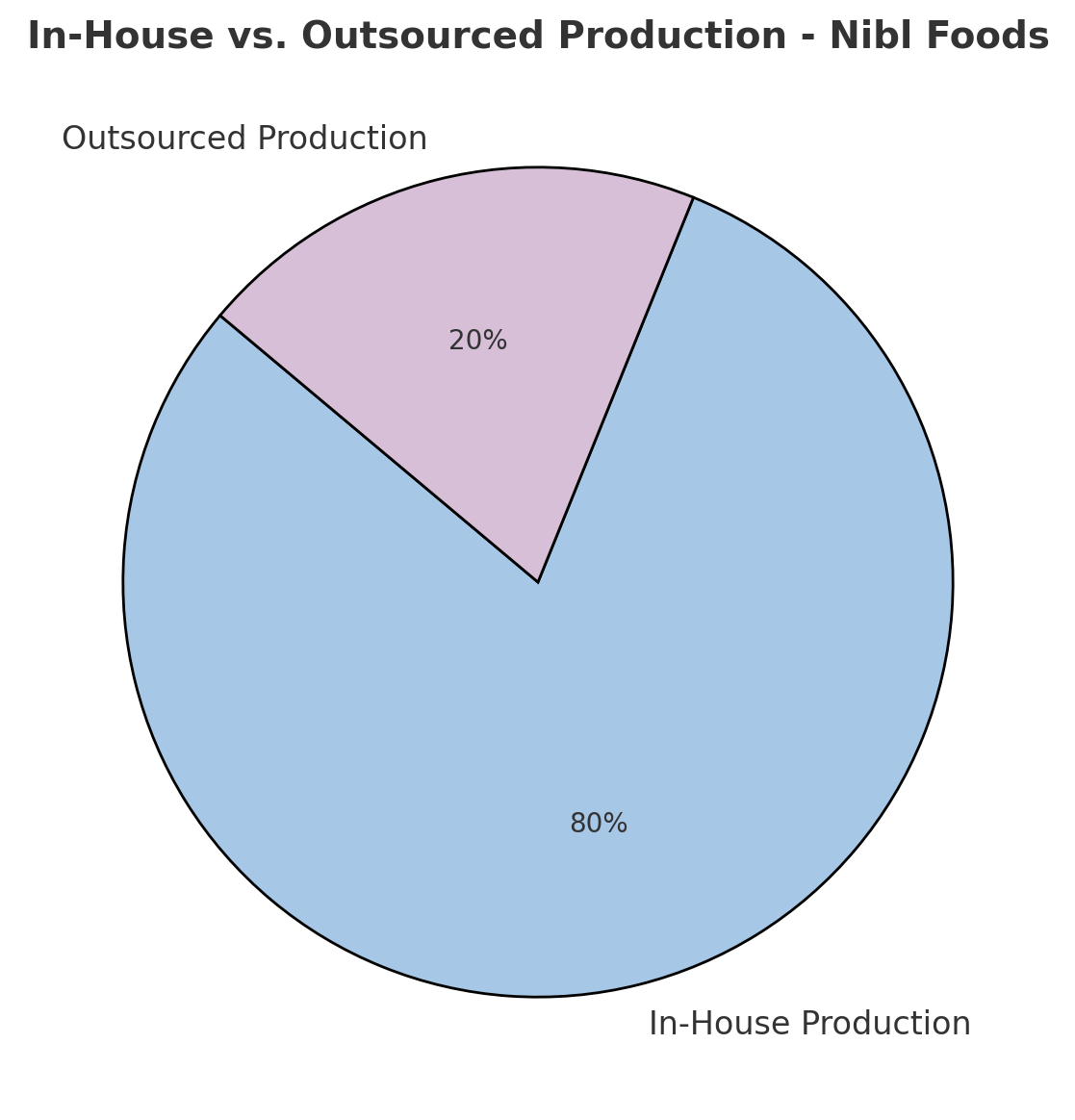A Vision Takes Root
"Great businesses don’t start with perfection. They start with an idea, a need, and an unshakable belief in solving a problem."
Every entrepreneurial journey begins somewhere, and for Mustafa, it wasn’t in a boardroom it was in his home kitchen.
A lifelong food enthusiast, he had always been fascinated by the science behind flavors, the balance of ingredients, and what made snacks truly enjoyable. What began as a casual hobby experimenting with flavors and textures slowly transformed into a mission to change the way people snack.
"I never set out to start a business. I just wanted to create something better something that wasn’t packed with artificial additives but still tasted amazing."
At first, it was just for family and friends a fun side project where he would create healthier versions of everyday snacks. But something interesting happened. People weren’t just complimenting his creations; they were asking for more.
Recognizing the Market Gap
While experimenting in his kitchen, Mustafa realized a glaring issue in the snack industry. Most available products fit into two extremes—they were either cheap but filled with preservatives or healthy but far too expensive for the average consumer. There was no middle ground—no option that was both affordable and free from artificial junk.
"I saw a massive gap in the market—people wanted clean-label snacks, but they didn’t want to pay a premium. That’s when I knew this idea had real potential."
Early Support & First Steps
Mustafa’s transition from passion to business wasn’t immediate. He had no prior experience in food manufacturing, supply chains, or retail sales—everything had to be learned from scratch. He leaned heavily on his inner circle, discussing ideas with friends and family, getting feedback on product taste, and most importantly, securing small loans from relatives to finance his initial production.
"I had to start small. I wasn’t looking for investors—I was looking for belief. And luckily, my family believed in me."
With limited resources, he researched suppliers, sourced ingredients, and hand-packed the first batches himself. He started by supplying small grocery stores in his local community, offering samples to gauge interest. The response was overwhelmingly positive. Customers weren’t just buying; they were coming back for more.
A Defining Moment: The First Big Retail Breakthrough
Mustafa knew that in order to turn Nibl Foods into a serious business, he needed to break into larger retail chains. But convincing store owners was no easy task. Big retailers are hesitant to take risks on small brands
"I walked into stores with my product, convinced that if they just gave it a chance, it would sell. Most turned me away. Some wouldn’t even take my samples. But I kept going."
After months of persistence, follow-ups, and relentless determination, Mustafa secured his first major retail placement with Shell. This wasn’t just about getting into a store it was about validation. The moment customers started purchasing his products from recognized retailers, it confirmed what he had always believed: there was a real market for clean, high-quality snacks at an affordable price.
That moment changed everything. Nibl Foods was no longer just an idea it was a brand in the making.
From Challenges to Breakthroughs
"In the middle of difficulty lies opportunity."
Every entrepreneur faces challenges, but it is often how they respond that defines their success. Mustafa’s journey with Nibl Foods was filled with obstacles—breaking into retail, managing financial constraints, ensuring scalability, and navigating digital marketing complexities. Yet, through persistence, strategic problem-solving, and adaptability, he turned each hurdle into a stepping stone for growth.
1. Breaking into Retail: Overcoming Industry Skepticism
Entering the retail market as an unknown brand was one of the biggest challenges Mustafa faced. Unlike digital-first businesses, retail success requires gaining the trust of store owners, securing prime shelf space, and proving demand all without an established track record.
"Retailers wouldn’t even take my calls at first. I had to visit them repeatedly, leaving samples, following up, convincing them to take a chance on us."
For months, Mustafa personally visited grocery stores, coffee chains, and fuel station marts, pitching his product. He faced multiple rejections, ignored calls, and disinterested managers but refused to give up. Instead of relying on aggressive marketing tactics, he focused on product quality and word-of-mouth customer validation.
His breakthrough came when Shell decided to stock Nibl Foods a moment that validated not just the brand but also his belief that persistence pays off. From there, other retailers followed, leading to expansion into PSO, Coffee Bean & Tea Leaf, and 30+ grocery outlets.
Retail Expansion Over Time
2018: Started in small grocery stores
2019: Secured placement in 5 premium retail outlets
2020: Expanded into 10+ specialty grocery stores
2021: Broke into Shell and PSO (Major Fuel Stations)
2022: Reached 30+ grocery outlets & coffee chains
2023: Digital presence reinforced retail expansion

2. Financial Constraints & Bootstrapping Growth
Scaling a business without external funding is a challenge few entrepreneurs can navigate successfully. Mustafa made a deliberate choice to bootstrap Nibl Foods, avoiding venture capital in favor of a cash-flow-driven growth model.
"I didn’t want to chase investors. I wanted to build something sustainable. That meant making every rupee count."
To sustain operations:
- He took short-term loans from family and friends to cover initial production costs.
- He focused on cost-efficient scaling, prioritizing incremental growth over risky expansion.
- Instead of overproducing, he used demand-driven manufacturing, ensuring lean inventory management.
This approach not only kept Nibl Foods financially stable but also gave him full control over business decisions, ensuring that growth was aligned with market demand.
3. Scaling Without Compromising Quality
As orders increased, Mustafa faced a classic food industry challenge scaling while maintaining quality. Many businesses struggle to uphold their original standards when transitioning from small-batch production to mass distribution.
"Customers loved our snacks, but I knew that as we scaled, the challenge would be ensuring every packet tasted just as good as the first batch we made."
To tackle this, Mustafa:
- Established rigorous quality control measures at every production stage.
- Partnered with trusted ingredient suppliers to maintain consistency.
- Developed in-house production processes to prevent reliance on third-party manufacturers.
By prioritizing quality over speed, Nibl Foods was able to scale operations without losing customer trust.

Instead of targeting every possible supermarket, Mustafa strategically focused on premium gas stations (Shell, PSO), specialty grocery stores, and coffee chains like Coffee Bean & Tea Leaf. These locations attracted consumers willing to try new, better-for-you snack options.
But convincing these retailers was another battle. Mustafa repeatedly pitched his products, left samples, and followed up for months before securing deals. The effort paid off once Shell and PSO came on board, other retailers followed suit.
2. Leveraging Digital & Social Commerce for Sustainable Growth
Unlike legacy snack brands that relied on traditional advertising, Nibl Foods embraced a digital-first strategy, ensuring that its online presence supported and amplified retail sales.
"At first, we threw money at big influencers. It didn’t work. The ROI just wasn’t there. We needed a smarter approach."
Mustafa pivoted from macro-influencers to micro-influencers (5K-7K followers), who had smaller but highly engaged audiences. This approach led to higher customer conversions at a fraction of the cost.
Additionally, Nibl Foods optimized AI-powered marketing tools to refine ad targeting, automate personalized engagement, and analyze customer trends. This data-driven approach:
- Increased online orders (15-20% of total revenue now comes from DTC sales).
- Drove in-store traffic by reinforcing brand trust before customers even saw the product on shelves.
- Enabled smarter marketing decisions, ensuring ad spend went to the right audiences.
Macro-Influencers vs. Micro-Influencers Effectiveness
Macro-Influencers (100K+ followers): Engagement Rate 1.2%, Sales Conversion 0.8%
Micro-Influencers (5K-7K followers): Engagement Rate 8.5%, Sales Conversion 3.5%
AI-Powered Ads: Increased targeting precision, reducing customer acquisition cost by 30%

3. Operational Efficiency: Scaling Without Losing Quality
As demand grew, Mustafa faced a challenge: how to increase production without sacrificing product integrity. Many food brands, in an attempt to scale quickly, resort to outsourcing production but that often leads to inconsistencies in quality.
"We weren’t willing to compromise. If we were going to grow, it had to be on our own terms."
To maintain control over production, Mustafa:
- Established rigorous quality control measures at every stage of production.
- Partnered with reliable ingredient suppliers to ensure consistency.
- Invested in in-house manufacturing capabilities, reducing dependency on third parties.
This commitment to quality allowed Nibl Foods to scale operations while maintaining the same high standards that customers trusted.
Transforming Support into Measurable Success
"Success isn’t about getting it right the first time it’s about learning, adapting, and improving with every step."
As Nibl Foods grew, Mustafa’s early challenges turned into defining lessons that shaped the business. From retail expansion to digital transformation, every milestone was a direct result of persistence, adaptability, and a willingness to rethink conventional strategies.
1. Innovation Through Necessity
Many entrepreneurs wait for the perfect conditions to start but Mustafa proved that starting with what you have and adapting along the way is key to success.
"I didn’t have a huge marketing budget or a big team. I had to be creative with what was available leveraging insights, testing different strategies, and pivoting quickly."
This flexibility allowed him to experiment with product placement, retail partnerships, and influencer collaborations until he found a model that worked. His ability to iterate and adjust was a major factor in Nibl Foods’ success.
2. Building a Customer-Centric Brand
From day one, Mustafa knew that customers weren’t just buying a snack they were buying into a philosophy of clean, high-quality food.
"Customers don’t just want a product. They want a brand they can trust, a company that listens, and a product they believe in."
By engaging directly with customers, incorporating their feedback into product development, and ensuring transparency in sourcing, Nibl Foods turned buyers into brand advocates.
3. Digital Strategy is a Business Essential, Not an Option
Unlike traditional snack brands that depended on heavy retail promotions, Nibl Foods leaned into digital channels to drive awareness, engagement, and sales.
"Initially, we spent on the wrong ads, targeted the wrong influencers, and got disappointing results. But once we refined our strategy, everything changed."
By shifting from macro-influencers to micro-influencers, using AI-powered marketing tools, and focusing on content-driven storytelling, Nibl Foods created an online presence that reinforced offline sales.
4. Trust is the Ultimate Growth Driver
Breaking into retail and scaling sustainably is difficult in any industry but in the food business, trust is everything.
"Retailers took months to give us shelf space, but once we got in, our product did the talking. Customers kept coming back, and that’s what convinced stores to expand our presence."
By prioritizing ingredient transparency, ethical sourcing, and quality consistency, Mustafa built not just a brand, but a reputation.
What This Story Teaches Us
Mustafa’s journey with Nibl Foods is a powerful lesson in strategic perseverance and adaptive growth. Much like a tree growing in unpredictable soil, Nibl Foods had to develop strong roots trust, persistence, and resourcefulness before expanding into a thriving business.
In the early stages, Mustafa relied on sheer determination and an unshakable belief in his product, navigating financial constraints, retail rejections, and marketing missteps. By steadily reinforcing the foundation of his business through customer trust, high-quality products, and smart scaling strategies he positioned Nibl Foods for long-term sustainability.
As the company grew, so did its network of strategic partnerships, micro-influencer collaborations, and retail expansions. These acted as the branches that carried Nibl Foods toward national recognition, demonstrating that growth isn’t about being everywhere at once, but about being in the right places at the right time.
This story reinforces an essential entrepreneurial truth: success isn’t about quick wins it’s about laying the groundwork for sustainable impact. Mustafa didn’t chase overnight success; instead, he built a business designed for longevity, proving that smart decisions, patience, and adaptability outweigh aggressive expansion.
In competitive industries, especially in developing economies where resources, funding, and formal mentorship are limited, Mustafa’s approach showcases how entrepreneurs can create value by leveraging innovation, persistence, and market insight. His ability to pivot when needed, optimize strategies, and maintain product integrity is a blueprint for anyone looking to scale a business in a way that is both sustainable and impactful.
Nibl Foods isn’t just a snack company it’s a testament to what’s possible when passion meets strategic execution. The real question is: how will you scale your vision?


In-House vs. Outsourced Production
80% of production remains in-house to maintain product quality
20% of production is outsourced for cost efficiency